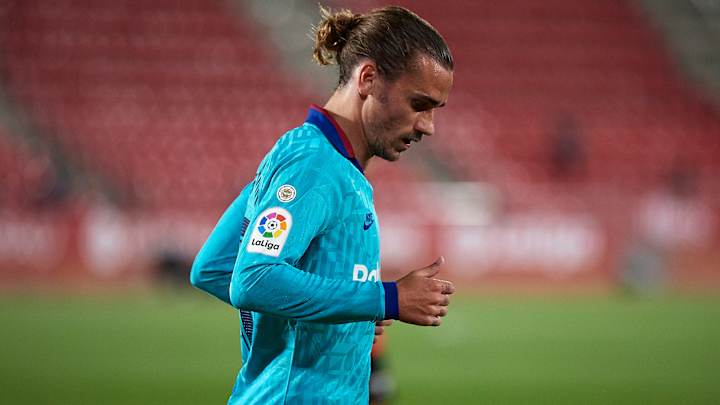Why Antoine Griezmann Has Been Such a Bust at Barcelona

There is a paradox that has come to dog Lionel Messi both with Barcelona and Argentina. That he is a brilliant player, probably the greatest ever to play the game, is not in doubt. But he does seem difficult for others to play with, and he does seem blighted by inept leadership, two issues that have come to a head most recently in the increasing struggles of Antoine Griezmann.
His performance against Athletic Bilbao on Tuesday was sadly typical. He had one shot. He completed two dribbles. He completed 76.1% of his 46 attempted passes. But essentially, he did nothing. He was anonymous, marooned on the left while the game went on inside before he was removed after 65 minutes. His replacement, 17-year-old Ansu Fati, was instantly more effective. On Griezmann's previous start, against Leganes, only two of the substitutes had fewer touches than he did. Last weekend brought stories of a fight with Messi in training. That’s not necessarily a major issue, as scuffles happen fairly regularly, but it fits a general narrative that seems to point to a player whose time at the club is–already–drawing to a close.
That Barcelona’s recruitment has been shambolic since Paris Saint-Germain lured Neymar away in 2017 is no secret. Philippe Coutinho never settled and spent this season on loan at Bayern Munich. Ousmane Dembele has struggled with injuries, and there are doubts over his professionalism. Paulinho always seemed like an odd fit. Malcom’s influence has been limited and Frenkie De Jong has not been anything like as commanding as he was at Ajax. But even in that catalogue of disappointment, the case of Griezmann stands out.
Barcelona had pursued him for two years. This was a player it had studied and tracked. He scored goals. He was inventive. He could work across the forward line. He had shown at Atletico Madrid that he was prepared to work ferociously hard. As a long-term replacement for the aging Luis Suarez, he seemed ideal. Here was somebody who could wean Barcelona away from its increasingly celebrity-driven model toward the hard-pressing days of the peak Guardiola years.
It’s easy to say now that Griezmann–who has 14 goals in all competitions but only eight in 30 league appearances after hitting at least 15 in La Liga in each of the last six years–doesn’t fit, but that was part of the point. He was supposed to be jarring, to re-instill some of the old values. The model, though, has proved resistant and it’s hard not to conclude that Messi is part of the problem. He is brilliant, of course he is. But he is also 33 and unable to run as he did a decade ago. He must be accommodated, but that accommodation itself creates problems.
The reason Barcelona’s midfield always looks stretched whenever it comes up against decent opposition is because it is always stretched. If the forward line isn’t tracking, then two things happen out of possession. If the opposition is in Barcelona’s half, it becomes detached, 30, 40, 50 yards distant from the midfield. But perhaps more troubling is what happens if it is not pressing. When the opposition has the ball in its own half, Barcelona’s back four should step up to squeeze the play, but it cannot do that if there is no pressure on the ball, because it then renders itself vulnerable to a simple pass in behind. And so the back four drops off, and the midfield three finds itself with too much space to cover.
Even in the attacking phase, Messi creates a problem. He gets on well with Suarez, the two dovetailing as Messi drifts from the right into the center. But that does tend to leave the third party out on the cold. Neymar was able to find a role on the left, and there was a pleasing fluidity to the vaunted M-S-N front three. Coutinho and Griezmann, though, have found that when they have come infield, they and Messi end up in each other’s way.
The chaotic transfer policy, meanwhile, goes on. Barcelona and Juventus have reportedly agreed to a swap deal (plus $11.2 million) for Arthur to move to Turin and Miralem Pjanic to come to Spain. Pjanic is a very fine player, but he is 30 and a neat ball-player is not necessarily what Barcelona needs right now. As the Swiss Ramble Twitter account has pointed out, player amortization allows both clubs to post a $67.2 million profit on the deal even with just $11.2 million changing hands, which may explain some of the attraction to Barcelona.
That may be enough to make a bid for Inter’s Lautaro Martinez possible within Financial Fair Play guidelines this summer. Again, his qualities as a player are not in doubt, but the bigger issue is how he would fit in. Barcelona’s board has rightly been criticized for the incoherence of its approach, but the real concern of the Griezmann affair is that his signing was one it had thought about. Perhaps the truth is that nobody can fit Barcelona as it currently is constructed.
More on Messi

An accomplished author of multiple books, Jonathan Wilson is one of the world’s preeminent minds on soccer tactics and history.